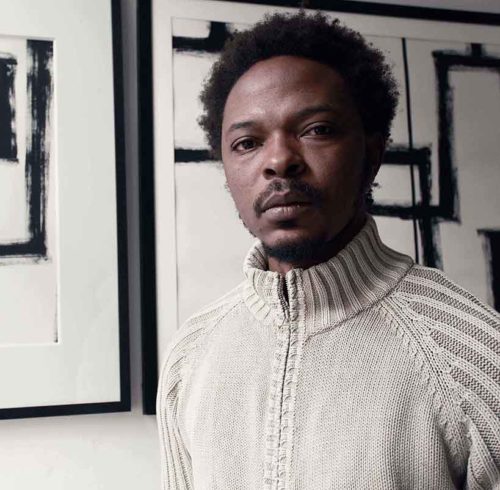Kolwezi
Sammy Baloji (Belgium / Democratic Republic of Congo)
2012
Since 2004, Sammy Baloji has been documenting artisanal mining by Chinese companies in Kolwezi, Katanga. The Kolwezi series, of which a photograph is presented at the Biennale de Lubumbashi 2019, is rooted in the context of the first democratic elections in Congo in 2006, where the increase in demand for copper and cobalt caused an influx of international investors in Katanga, including Chinese companies. The collapse of the price of these two ores during the economic crisis of 2007 led to the collapse of Gécamines, whose bankruptcy brought out a new mode of work: artisanal mining of former mining sites. Kolwezi offers an exploration of the real and fantasized relationship between China and Africa, combining photographs of miners in their fortunes shelters and at work, with Chinese posters featuring idyllic urban or rural landscapes. The contrast between fantasy and reality is all the more striking when documentary photographs are brought together with these kitsch posters, which are very popular in the DRC. Baloji explains integrating these into his work “as the utopian extension of a future born of artisanal mining, the export of minerals and the continuous displacement of populations.”
Sammy Baloji was born in 1978 in Lubumbashi. He holds a bachelor degree in literature and social sciences. He was working as a cartoonist when he received a formal training in photography from Simon Mukunday and Marie-Françoise Plissart. Since 2005, Baloji has been exploring the memory and history of the Democratic Republic of the Congo. His work is an ongoing research on the cultural, architectural and industrial heritage of the Katanga region, as well as a questioning of the impact of the Belgian colonization. His use of photography archives enables him to manipulate time and space, thus comparing old colonial narratives to contemporary economic imperialisms. His work is like a single story in loop in which the same mistakes, the same injustices and the same traumas repeat themselves around the world. His videos and photography series highlight how identities are shaped, transformed, perverted and reinvented. His critical look on contemporary societies are warnings about how cultural clichés continue to shape collective memories, thus allowing social and political power games to keep on dictating human behaviours.
Baloji participated to the Bamako African Photography Encounters in 2007, the Lyon biennale in 2015, the Venice biennale in 2015, PhotoQuai festival at the Quai Branly Museum in Paris in 2015, the Dakar biennale in 2016 and Documenta XIV in 2017. He has exhibited at the Royal Museum of Central Africa in Tervuren, the Kunstmuseum aan zee in Oostende, the Tate Modern
in London, the Africa Center in New York and the Smithsonian National Museum of African Art in Washington DC. He received several awards including from the Prince Claus Foundation in The Netherlands, the Bamako African Photography Encounters and the Dakar biennale. He won the Rolex Mentor and Protégé Arts Initiative in 2014.
Sammy Baloji is a co-founder of the Picha Encounters, which will later become the Biennale de Lubumbashi. He is also one of the contributors of the research project On-Trade-Off, initiated by Picha and Enough Room for Space.
His participation in the biennale is supported by Flanders State of the Art and the Complexe La Plage.
